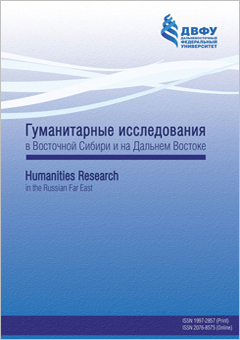Metaphysical foundations of Johann Georg Schwarz’s pedagogical practice
DOI:
https://doi.org/10.24866/1997-2857/2023-3/110-116Keywords:
education, aesthetics, taste, Russian philosophy, XVIIIth century, J.G. Schwarz, pedagogyAbstract
Johann Georg Schwarz created his works, when Russian philosophy was just taking its first steps and when the aesthetics was just emerging in Europe as a new branch of philosophy. Under these conditions the personality of Schwarz appears as a transitional one and suits very well for a research in the field of the history of philosophy. The article demonstrates the transitional nature of Schwarz philosophy by focusing on his notion of taste, since it contains moral features of the previous period and the purely aesthetic features that Kant would eventually attach to it. The author traces how the concept of taste allows Schwartz to connect a kind of quite eclectic philosophy of freemasonry to specific pedagogical practice that remains relevant today.
Downloads
References
Бердяев Н.А. Русская идея. Основные проблемы русской мысли XIX века и начала XX века. Париж: YMCA-Press, 1971.
Вернадский Г.В. Русское масонство в царствование Екатерины II. СПб.: Изд-во им. Н.И. Новикова, 1999.
Гадамер Х.-Г. Истина и метод: Основы философской герменевтики. М.: Прогресс, 1988.
Кондаков Ю.Е. Орден золотого и розового креста в России. Теоретический градус соломоновых наук. СПб.: МП Астерион, 2012.
Кривко Т.М. «Начертание первых оснований немецкого слога» И.Г. Шварца и «Сокращенный курс российского слога» В.С. Подшивалова // Вестник Тверского государственного университета. Серия «Филология». 2015. № 1. С. 317–323.
Лонгинов М.Н. Новиков и московские мартинисты. М.: Типография Грачева и Ко, 1867.
Милюков П.Н. Очерки по истории русской культуры. Ч. 3. Национализм и общественное мнение. Вып. 2. СПб.: Типография И.П. Скороходова, 1903.
Отчет Императорской публичной библиотеки за 1874 г. СПб.: Типография Второго Отделения Собственной Е.И.В. Канцелярии, 1875.
Прохоров А.И. Философия языка И.Г. Шварца: сакрализация исторической памяти // Вестник Русской христианской гуманитарной академии. 2022. Т. 23. № 4. С. 130–139.
Симанков В.И. Из разысканий о журнале «Вечерняя заря» (1782) // XVIII век: сборник статей и материалов. Т. 26. СПб.: Наука, 2011. С. 169–186.
Тукалевский В.Н. Н.И. Новиков и И.Г. Шварц // Масонство в его прошлом и настоящем. Т. 1. М.: Задруги, 1914. С. 175–226.
Философическое рассуждение о Троице в человеке, или опыт доказательства, почерпнутого из разума и Откровения, что человек состоит 1) из тела 2) души и 3) духа // Вечерняя Заря. 1782. Апрель. С. 265–309.
Флоровский Г. Пути русского богословия. Минск: Изд-во Белорусского Экзархата, 2006.
Шварц // Биографический словарь профессоров и преподавателей Императорского Московского университета. Ч. II. М.: Университетская типография, 1855. С. 574–599.
Шварц И.Г. Беседы о возрождении и молитве // Шварц И.Г. Беседы о возрождении и молитве. Записки. Речи. Материалы для биографии. Донецк: Вебер, 2010. С. 5–76.
Шварц И.Г. Начертание первых оснований немецкого слога для употребления в публичных лекциях при Императорском Московском университете. Ч. I. М.: Университетская типография, 1780.
Шварц И.Г. О трех познаниях: любопытном, приятном и полезном // Шварц И.Г. Лекции. Донецк: Вебер, 2008. С. 3–54.
Шварц И.Г. Речь о способах учения языков // Шварц И.Г. Беседы о возрождении и молитве. Записки. Речи. Материалы для биографии. Донецк: Вебер, 2010. С. 92–96.
Шварц И.Г. Экстракты // Шварц И.Г. Беседы о возрождении и молитве. Записки. Речи. Материалы для биографии. Донецк: Вебер, 2010. С. 77–91.
Downloads
Published
Issue
Section
License
Copyright (c) 2023 Humanitarian research in the Eastern Siberia and the Far East

This work is licensed under a Creative Commons Attribution-NonCommercial-NoDerivatives 4.0 International License.












